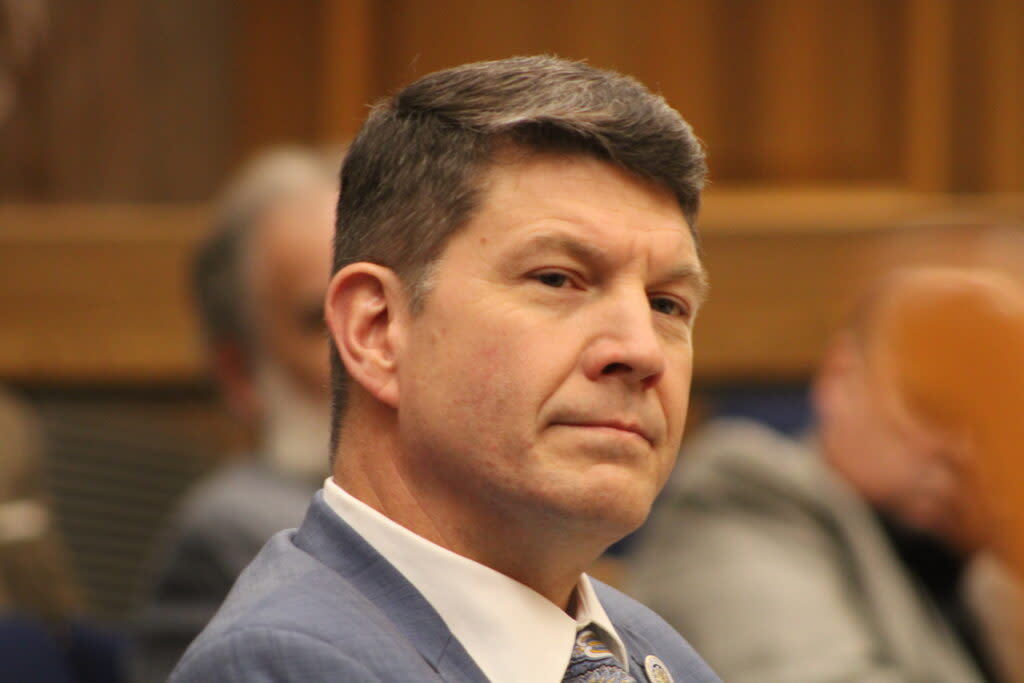Voting irregularities lead to passage of bill targeting gov’t employee unions

Rep. Raymond Crews. (LAI photo)
State Rep. Jerome “Zee” Zeringue, R-Houma, flashed a thumbs-down Wednesday while away from the voting machine on his desk, indicating to the House speaker he was voting no on a controversial bill restricting union activities among government workers. The speaker acknowledged his vote, and his name lit up in red on the tally board.
Moments later, it flashed to green. The bill passed 53-39, barely clearing the 53-vote threshold to pass the House.
House Bill 571 by Rep. Raymond Crews, R-Bossier City, prohibits public sector union members, except for police and firefighter unions, from discussing or organizing union activities while working or on paid leave. It also nullifies any employment contracts that provide compensation, including paid leave, for the performance of such activities.
Crews’ bill is opposed by several labor organizations, who have raised concerns that the bill violates the First Amendment. The bill would allow citizens to sue and be awarded costs for catching violations of the prohibition. The attorney general or a district attorney could also bring enforcement action.
“Taking away the voices of thousands — tens of thousands — of workers, their rights to assemble and their freedom of speech is very alarming,” Matt Wood, a lobbyist for the Louisiana AFL-CIO said in an interview with the Illuminator.
GET THE MORNING HEADLINES DELIVERED TO YOUR INBOX
Zeringue was not the only member to have their vote changed.
Rep. Jack McFarland, R-Jonesboro, had stepped outside the chamber at the time of the vote. Although didn’t give any other member permission to vote for him on Crews’ bill, he was recorded as a “yes” on the proposal. The final tally should have shown him as absent.
It’s not uncommon for lawmakers to miss an occasional vote for any number of reasons, including attending another legislative meeting, taking a constituent phone call or going to the restroom, although lawmakers sometimes purposefully walk out for strategic reasons. What is uncommon is for a legislator to take advantage of that absence to advance their own agenda. Wood said he had never seen anything like this in his years lobbying the Legislature.
Neither McFarland or Zeringue would speculate who had voted for them when asked by the Illuminator.
House rules only allow a legislator to vote on another legislator’s machine if they have been given permission. If a member violates this, they can face punishment.
Legislators cannot change their vote if it would change the final outcome, meaning Zeringue and McFarland cannot seek recourse unless they seek punishment for whomever voted their machines without their consent.
Neither McFarland nor Zeringue intend to do so, each told the Illuminator.
Rep. Timothy Kerner, R-Jean Lafitte, later changed his vote from “no” to “yes,” bumping the count to 54-38. His change was allowed because it did not affect the bill’s final outcome.
Wood said he was alarmed to see the democratic process disrupted.
“It’s almost like the Saints’ (2019 conference championship) game where, last play of the game, the ump calls the wrong call and you lose the game,” Wood said. “We stopped that bill from passing the floor but the bad calls … overturned the score.”
The bill is one of many anti-union measures the Louisiana Legislature is considering. Many seek to restrict public sector unions. Collectively, the proposed legislation could effectively make it impossible for these groups, which represent teachers and other government workers, from operating in Louisiana.
In an interview, Crews said he was not familiar with the irregularities with the vote, but said he believed his bill would’ve passed eventually, as house rules allow legislators to bring failed bills back for another vote.
Crews’ bill will next be discussed by the Senate Labor and Industrial Relations Committee.
The post Voting irregularities lead to passage of bill targeting gov’t employee unions appeared first on Louisiana Illuminator.

